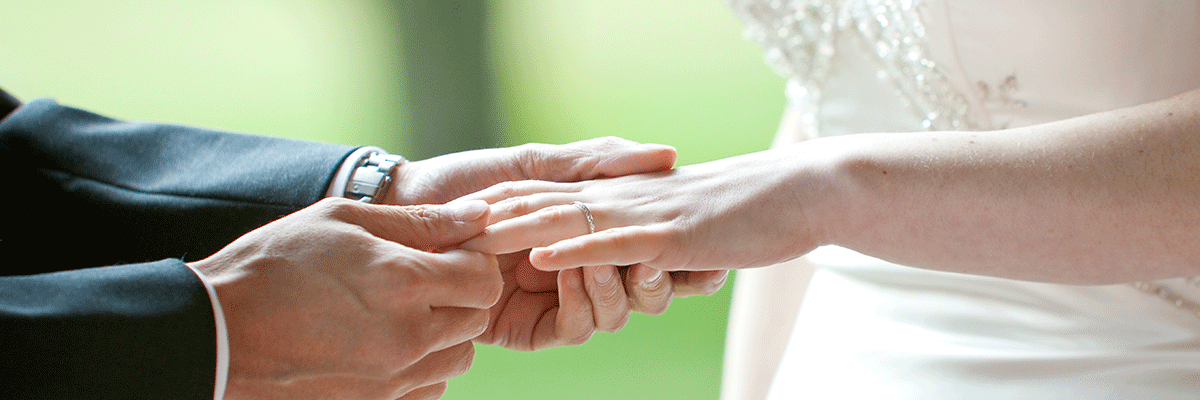
How to Select the Perfect Officiant for Your Wedding
Do you want a traditional religious ceremony or an informal exchange of vows? A longer service or a short ceremony so you can get to photos and the celebration? Ask these questions of any officiant to make sure you have the right match for you and your significant other.
Questions to Ask Potential Officiants
Whether you want your ceremony to be led by a civil servant, a religious officiant or your best friend, here's everything you need to know - and ask - before you seal the deal.
by Catherine Jessee, read the original article on The KnotNo matter where your wedding ceremony takes place, it's important to make sure your officiant is someone who both you and your partner trust and mutually respect. If your nuptials will take place in a house of worship (like a church or synagogue), you may not need to book an officiant. But if your officiant doesn't already know you and your partner, they should be willing and able to get to know you as a couple. Even if you think they know everything about you, it's important to have a conversation about your and their expectations. Not only does it preclude any miscommunication on the wedding day, but it also leads to a more intimate, personalized ceremony. Whether your ceremony is civil, religious or somewhere in between, we've broken down all possible questions you should ask potential officiants.
Will you give a speech as part of the ceremony?
Why you want to know:
Depending on the length of ceremony you want, a speech may or may not be in the cards for your officiant. Ask them what a typical ceremony looks like for them and how flexible they are.
Will we have input and/or be able to read it beforehand?
Why you want to know:
Your ceremony doesn't need to be a surprise. Ask your potential officiant whether you can have some input in their proceedings and speech (if they plan on giving one). Chances are they want you to be pleased and they'll be more than happy to work with you to make it perfect.
Will you give a sermon?
Why you want to know:
If you plan on a ceremony of faith with a religious officiant, it's worth knowing whether they plan on giving a sermon. If so, talk to them about its length and subject or whether you can help them choose a subject or passage of text to draw from and review it together.
Will you perform an interfaith ceremony (if applicable)?
Why you want to know:
If you and your partner have different religious backgrounds and want an interfaith ceremony, this is a vital question. It's important that your officiant respect your decision. Pastors, priests and rabbis who serve diverse communities might be more used to working with clergy from different faiths and willing to perform a flexible ceremony. Interfaith ministers strive to be flexible and accommodating to couples of different religions and to same-sex couples as well.
Are you willing to marry us at a nonreligious site (if applicable)?
Why you want to know:
If you're interested in tying the knot outside of your house of worship, ask your religious officiant if they're willing to lead the ceremony elsewhere. As ceremonies in nonreligious venues get more popular, it's important to know if your religious officiants prefers to stick to tradition.
What is the ceremony fee or required donation?
Why you want to know:
Besides making sure they're available on the right date, confirming their fee for the service is also a must. If your officiant or civil servant only takes donations, ask what other couples have donated.
Are you open to personalized vows, readings, poems or music?
Why you want to know:
If you want the personalization and flexibility of incorporating things like music, poems or literature into the ceremony, be sure your officiant is on board. This is also a good time to ask whether they have any rules, restrictions or customs you should know about. Chances are they're happy to accommodate your wishes but you'll want to be sure before getting into the nitty-gritty of planning.
Will you help us work on our vows?
Why you want to know:
If you and your partner want to write your own vows but don't know where to begin, talk it through with your officiant. See if they're willing to lead the charge on combining standard ceremony wording with your own written vows. If you're really stuck, they might have ideas or suggestions from past experiences.
Can you help me deal with family conflicts connected to the ceremony?
Why you want to know:
If there tends to be drama in your family, the officiant can act as a built-in mediator. Ask them if they'd be willing to take the heat when your relative has more than a few suggestions for your ceremony.
PLEASE NOTE: Any recommendation regarding licensure, insurance or permit for a wedding professional is a general guideline for events nationwide and not specific to a particular state, county or city. Please verify with local agencies if you have any questions regarding a specific vendor's ability to work with you on your event.